3十句英语打天下 第三课
2023年大学英语精读第三册第3课Why,I,Teach,3篇

2023年大学英语精读第三册第3课Why,I,Teach,3篇大学英语精读第三册第3课Why I Teach1Every teacher probably asks himself time and again: What are the reasons for choosing teaching as a career? Do the rewards teaching outweigh the trying ments? Answering these questions is not a simple task. Let“s see what the author says.Why I TeachPeter G. BeidlerWhy do you teach? My friend asked the question when I told him that I didn"t want to be considered for an administrative position. He was puzzled that I did not want what was obviously a "step up" toward what all Americans are taught to want when they grow up: money and power.Certainly I don"t teach because teaching is easy for me. Teaching is the most difficult of the various ways I have attempted to earn my living: mechanic, carpenter, writer. For me, teaching is a red-eye, sweaty-palm, sinking-stomach profession. Red-eye, because I never feel ready to teach no matter how late I stay up preparing. Sweaty-palm, because I"m always nervous before I enter the classroom, sure that I will be found out for the fool that I am. Sinking-stomach, because I leave the classroom an hourlater convinced that I was even more boring than usual.Nor do I teach because I think I know answers, or because I have knowledge I feel pelled to share. Sometimes I am amazed that my students actually take notes on what I say in class!Why, then, do I teach?I teach because I like the pace of the academic calendar. June, July, and August offer an opportunity for reflection, research and writing.I teach because teaching is a profession built on change. When the material is the same, I change —— and, more important, my students change.I teach because I like the freedom to make my own mistakes, to learn my own lessons, to stimulate myself and my students. As a teacher, I"m my own boss. If I want my freshmen to learn to write by creating their own textbook, who is to say I can"t? Such courses may be huge failures, but we can all learn from failures.I teach because I like to ask questions that students must struggle to answer. The world is full of right answers to bad questions. While teaching, I sometimes find good questions.I teach because I enjoy finding ways of getting myself and my students out of the ivory tower and into the real world. I once taught a course called "Self-Reliance in a Technological Society." My 15 students read Emerson, Thoreau, and Huxley. They kept diaries. They wrote termpapers.But we also set up a corporation, borrowed money, purchased a run-down house and practiced self-reliance by renovating it. At the end of the semester, we would the house, repaid our loan, paid or taxes, and distributed the profits among the group.So teaching gives me pace, and variety, and challenge, and the opportunity to keep on learning.I have left out, however, the most important reasons why I teach.One is Vicky. My first doctoral student, Vicky was an energetic student who labored at her dissertation on a little-known 14th century poet. She wrote articles and sent them off to learned journals. She did it all herself, with an occasional nudge from me. But I was there when she finished her dissertation, learned that her articles were accepted, got a job and won a fellowship to Harvard working on a book developing ideas she"d first had as my student.Another reason is George, who started as an engineering student, then switched to English because he decided he liked people better than things.There is Jeanne, who left college, but was brought back by her classmates because they wanted her to see the end of the self-reliance house project. I was here when she came back. I was there when she told me that she later became interested in the urban poor and went on to e acivil rights lawyer.There is Jacqui, a cleaning woman who knows more by intuition than most of us learn by *ysis. Jacqui has decided to finish high school and go to college.These are the real reasons I teach, these people who grow and change in front of me. Being a teacher is being present at the creation, when the clay begins to breathe.A "promotion" out of teaching would give me money and power. But I have money. I get paid to do what I enjoy: reading, talking with people, and asking question like, "What is the point of being rich?"And I have power. I have the power to nudge, to fan sparks, to suggest books, to point out a pathway. What other power *?But teaching offers something besides money and power: it offers love. Not only the love of learning and of books and ideas, but also the love that a teacher feels for that rare student who walks into a teacher"s life and begins to breathe. Perhaps love is the wrong word: magic might be better.I teach because, being around people who are beginning to breathe, I occasionally find myself catching my breath with them.大学英语精读第三册第3课Why I Teach2administrativea. of the management of affairs 行政的,管理的administrationn. 管理(部门),行政(机关)puzzlevt. fill with doubt and confusion 使迷惑step (-) upn. promotion; increase in size, speed, etc.mechanicn. skilled workman, esp. one who uses or repairs machines and tools 机械工;机修工sweatya. covered with sweat, sweatingpalma. 手掌professionn. occupation, esp. one requiring special training, such as law, medicine, or teachingconvincevt. make (sb.) feel certain; cause (sb.) to realizepelvt. force (sb. or sth. to do sth.)pacen. rate or speed of development, or in walking, etc. 速度;步速calendarn. 日程表,日历opportunityn. favourable occasion or chancereflectionn. careful thinking; consideration 深思;考虑reflect vi.stimulatevt. encourage; excite 刺激;激励freshmann. student in his first year at a college or universityfailuren. a person, attempt, or thing that fails; lack of successivoryn. 象牙ivory towern. place or condition of retreat from the world of action into a world of ideas and dreams 象牙塔self-reliancen. ability to do things and make decisions by oneself 依靠自己;自力更生reliancen. trust, confidence; dependence 信赖;信心;依靠technologicala. of or related to technology 技术的corporationn. (AmE) 有限公司run-downa. old and broken or in bad conditionrenovatevt. restore (old buildings, oil paintings, etc.) to a former, better state 修复,修整semestern. (AmE) either of the two periods into which a school year is divided; term 学期repayvt. pay back (money, etc.)loann. sth. lent, esp. a sum of money 借出的东西;贷款distributevt. divide among several or many; give or send out 分发;分送distribution n.varietyn. difference in quality, type or character; a number of or a collectionof different things 变化,多样化;种种challengen. the quality of demanding petitive action, interest, or though 挑战doctorala. having to do with the university degree of doctor 博士的energetica. vigorous 精力充沛dissertationn. (学位)论文poetn. one who writes poetrylearneda. showing or requiring much knowledge 博学的journaln. magazine or daily newspaper 杂志;日报occasionala. happening from time to time, not regular 偶尔的,间或的nudgen. (fig.) words, actions or feeling that stimulate 启示vt. push or touch slightly, esp. with the elbow to attract attention; (fig.) stimulatefellowshipn. position or a sum of money granted to a person for advanced study or research 研究员职位;研究员薪金switchvt. change or shift; turnurbana. of a town or citycivil rightsn. the rights of a citizen without regard to his race, religion, sex, etc.公民权lawyern. person who practises law 律师intuitionn. (power of) the immediate understanding of truths, events, facts without reasoning 直觉*ysisn. the separation of a substance into parts for careful examination and study 分析creationn. act of creating; sth. created 创造(物)clayn. 粘士pointn. main idea or purpose 要点;意义,目的pathwayn. pathrarea. unusually good; distinctive 稀有的;杰出的magicn. mysterious charm; strange influence or power; art of obtaining mysterious results by tricks 魔力;魔术大学英语精读第三册第3课Why I Teach3stay upnot go to bed until after the usual time 不睡觉,熬夜take notes 记笔记build onbase on; use as a base for further developmentkeep a diary记日记leave outfail to mention or include; omitsend offpost; dispatchwork at/ ongive one"s attention to doing or trying to docatch one"s breathrest and get back one"s normal breath, as after running; stop breathing for a moment from surprise, fear, shock, etc.。
迪士尼神奇英语第三课Word
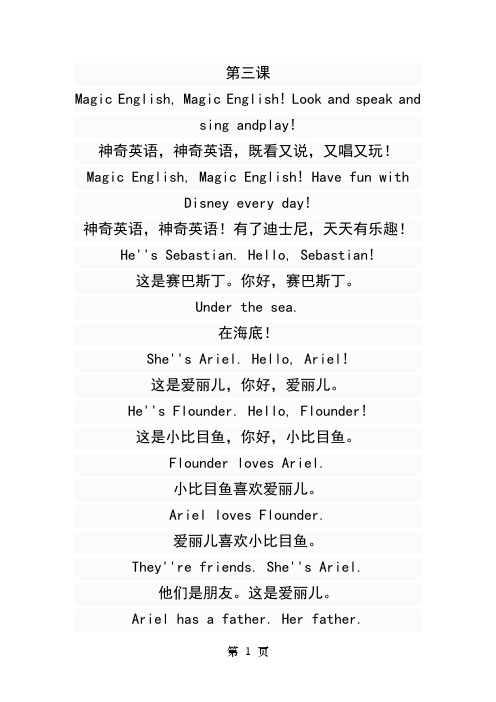
第三课Magic English, Magic English! Look and speak andsing andplay!神奇英语,神奇英语,既看又说,又唱又玩!Magic English, Magic English! Have fun withDisney every day!神奇英语,神奇英语!有了迪士尼,天天有乐趣!He''s Sebastian. Hello, Sebastian!这是赛巴斯丁。
你好,赛巴斯丁。
Under the sea.在海底!She''s Ariel. Hello, Ariel!这是爱丽儿,你好,爱丽儿。
He''s Flounder. Hello, Flounder!这是小比目鱼,你好,小比目鱼。
Flounder loves Ariel.小比目鱼喜欢爱丽儿。
Ariel loves Flounder.爱丽儿喜欢小比目鱼。
They''re friends. She''s Ariel.他们是朋友。
这是爱丽儿。
Ariel has a father. Her father.爱丽儿有个父亲。
她的父亲。
Ariel has sisters. Her sisters.爱丽儿有几个姐姐,她的姐姐。
Ariel has friends. Her friends.爱丽儿有一些朋友。
她的朋友。
Dance! Dance! They''re dancing.跳呀!他们在跳舞。
Sing! Sing! They''re singing.唱呀!他们在唱歌。
Sebastian is singing.赛巴斯丁在唱歌。
Ariel has friends. Her friends.爱丽儿有一些朋友。
她的朋友。
They''re dancing. They''re singing.他们在跳舞。
Lesson3PubTalkandtheKing课文翻译
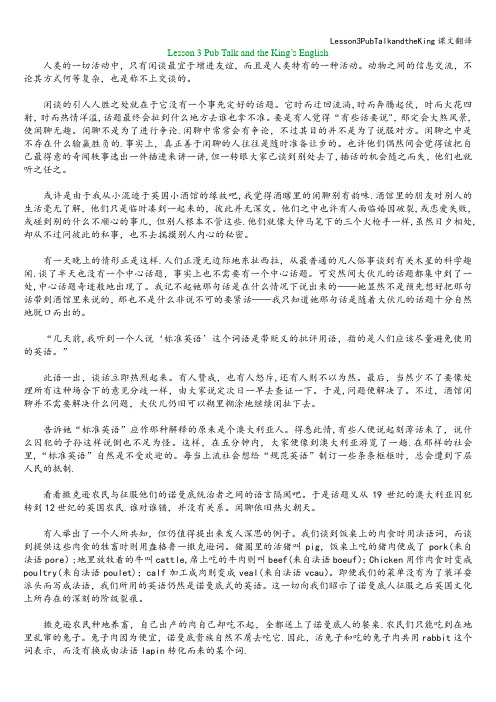
Lesson 3 Pub Talk and the King’s English人类的一切活动中,只有闲谈最宜于增进友谊,而且是人类特有的一种活动。
动物之间的信息交流,不论其方式何等复杂,也是称不上交谈的。
闲谈的引人人胜之处就在于它没有一个事先定好的话题。
它时而迂回流淌,时而奔腾起伏,时而火花四射,时而热情洋溢,话题最终会扯到什么地方去谁也拿不准。
要是有人觉得“有些话要说",那定会大煞风景,使闲聊无趣。
闲聊不是为了进行争论.闲聊中常常会有争论,不过其目的并不是为了说服对方。
闲聊之中是不存在什么输赢胜负的.事实上,真正善于闲聊的人往往是随时准备让步的。
也许他们偶然间会觉得该把自己最得意的奇闻轶事选出一件插进来讲一讲,但一转眼大家已谈到别处去了,插话的机会随之而失,他们也就听之任之。
或许是由于我从小混迹于英国小酒馆的缘故吧,我觉得酒瞎里的闲聊别有韵味.酒馆里的朋友对别人的生活毫无了解,他们只是临时凑到一起来的,彼此并无深交。
他们之中也许有人面临婚因破裂,或恋爱失败,或碰到别的什么不顺心的事儿,但别人根本不管这些.他们就像大仲马笔下的三个火枪手一样,虽然日夕相处,却从不过问彼此的私事,也不去揣摸别人内心的秘密。
有一天晚上的情形正是这样.人们正漫无边际地东扯西拉,从最普通的凡人俗事谈到有关木星的科学趣闻.谈了半天也没有一个中心话题,事实上也不需要有一个中心话题。
可突然间大伙儿的话题都集中到了一处,中心话题奇迹般地出现了。
我记不起她那句话是在什么情况下说出来的——她显然不是预先想好把那句话带到酒馆里来说的,那也不是什么非说不可的要紧话——我只知道她那句话是随着大伙儿的话题十分自然地脱口而出的。
“几天前,我听到一个人说‘标准英语’这个词语是带贬义的批评用语,指的是人们应该尽量避免使用的英语。
”此语一出,谈话立即热烈起来。
有人赞成,也有人怒斥,还有人则不以为然。
最后,当然少不了要像处理所有这种场合下的意见分歧一样,由大家说定次日一早去查证一下。
新概念英语逐句解读第三册第2课
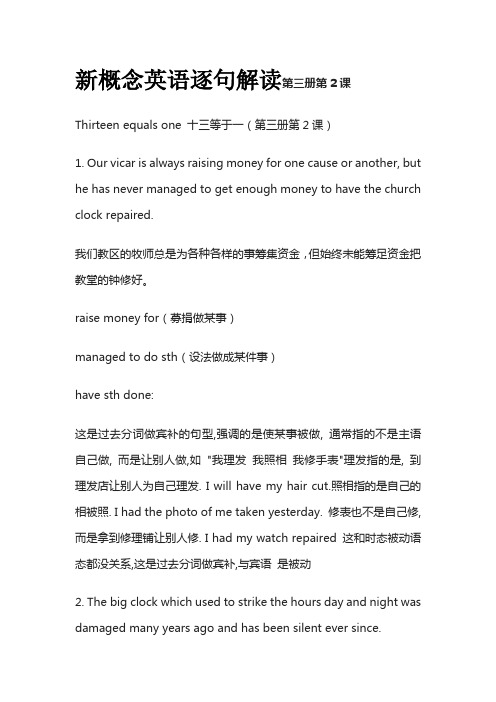
新概念英语逐句解读第三册第2课Thirteen equals one 十三等于一(第三册第2课)1. Our vicar is always raising money for one cause or another, but he has never managed to get enough money to have the church clock repaired.我们教区的牧师总是为各种各样的事筹集资金,但始终未能筹足资金把教堂的钟修好。
raise money for(募捐做某事)managed to do sth(设法做成某件事)have sth done:这是过去分词做宾补的句型,强调的是使某事被做, 通常指的不是主语自己做, 而是让别人做,如"我理发我照相我修手表"理发指的是, 到理发店让别人为自己理发. I will have my hair cut.照相指的是自己的相被照. I had the photo of me taken yesterday. 修表也不是自己修, 而是拿到修理铺让别人修. I had my watch repaired 这和时态被动语态都没关系,这是过去分词做宾补,与宾语是被动2. The big clock which used to strike the hours day and night was damaged many years ago and has been silent ever since.教堂的钟很大,以前不分昼夜打点报时,但在很多年前遭到了毁坏,从此便无声无息了。
used to(过去常常)要注意与be used to 以及get used to的区别:used to 后跟强调动作的动词时表示"过去常常";后面跟表示状态的词时,表示"曾经,一度"。
used to 的后面跟。
2十句英语打天下 第二课
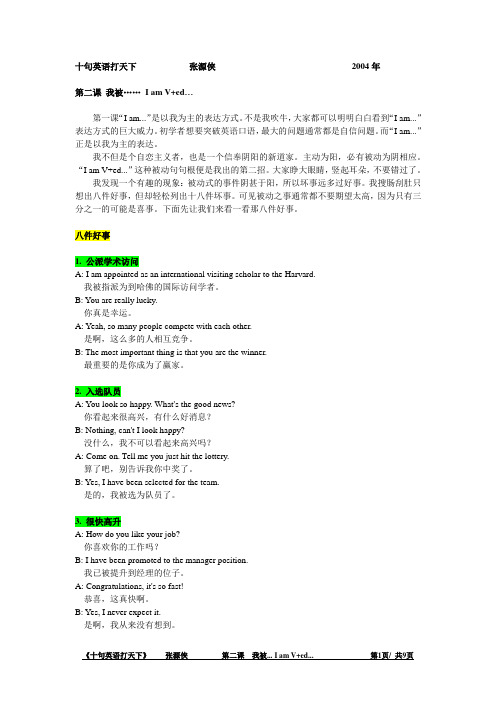
十句英语打天下张源侠2004年第二课我被……I am V+ed…第一课“I am...”是以我为主的表达方式。
不是我吹牛,大家都可以明明白白看到“I am...”表达方式的巨大威力。
初学者想要突破英语口语,最大的问题通常都是自信问题。
而“I am...”正是以我为主的表达。
我不但是个自恋主义者,也是一个信奉阴阳的新道家。
主动为阳,必有被动为阴相应。
“I am V+ed...”这种被动句句根便是我出的第二招。
大家睁大眼睛,竖起耳朵,不要错过了。
我发现一个有趣的现象:被动式的事件阴甚于阳,所以坏事远多过好事。
我搜肠刮肚只想出八件好事,但却轻松列出十八件坏事。
可见被动之事通常都不要期望太高,因为只有三分之一的可能是喜事。
下面先让我们来看一看那八件好事。
八件好事1. 公派学术访问A: I am appointed as an international visiting scholar to the Harvard.我被指派为到哈佛的国际访问学者。
B: Y ou are really lucky.你真是幸运。
A: Y eah, so many people compete with each other.是啊,这么多的人相互竞争。
B: The most important thing is that you are the winner.最重要的是你成为了赢家。
2. 入选队员A: Y ou look so happy. What's the good news?你看起来很高兴,有什么好消息?B: Nothing, can't I look happy?没什么,我不可以看起来高兴吗?A: Come on. Tell me you just hit the lottery.算了吧,别告诉我你中奖了。
B: Y es, I have been selected for the team.是的,我被选为队员了。
新概念英语第三册逐句精讲第课不买也不卖

新概念英语第三册逐句精讲第课不买也不卖新概念英语第三册逐句精讲:第27课不买也不卖lesson27 Nothing to Sell and Nothing to Buy 不买也不卖新概念3课文内容:It has been said that everyone lives by selling something. In the light of this statement, teachers live by sellingknowledge,philosophers by selling wisdom and priests by selling spiritual comfort. Though it may be possible to measure the value of material goods in terms of money, it is extremely difficult to estimate the true value of the services which people perform for us. There are times when we would willingly give everything we possess to save our lives, yet we might grudge paying a surgeon a high fee for offering us precisely this service. The conditions of society are such that skills have to be paid for in the same way that goods are paid for at a shop. Everyone has something to sell.Tramps seem to be the only exception to his general rule. Beggars almost sell themselves as human beings to arouse the pity of passers-by. But real tramps are not beggars. They have nothing to sell and require nothing from others. In seeking independence, they do not sacrifice their human dignity. A tramp may ask you for money, but he will never ask you to feel sorry for him. He has deliberately chosen to lead the life he leads and is fully aware of the consequences. He may never be sure where the next meal is coming from, but he is free form the thousands of anxieties which afflict other people. His few material possessions make it possible for him to move from place to place with ease. By having to sleep in the open, he gets far closer to the world ofnature than most of us ever do. He may hunt, beg, or steal occasionally to keep himself alive; he may even, in times of real need, do a little work; but he will never sacrifice his freedom. We often speak of tramps with contempt and put them in the same class as beggars, but how many of us can honestly say that we have not felt a little envious of their simple way of life and their freedom from care?新概念英语3逐句精讲:1.It has been said that everyone lives by selling something.据说每个人都靠出售某种东西来维持生活。
学英语三字经顺口溜已排版可直接打印

1. 我家dad 爸爸,脾气bad 坏,让我sad 伤心难过;2. 有只cat 猫咪,非常fat 肥胖, 专吃rat 鼠;3. 放下plate 盘子,赶到gate 门口,已经late 晚了;4. 清晨wake 醒来,来到lake 湖边,钓上snake 蛇;5. 撇下net 网,鱼没get 得到,衣服wet 湿了;6. 为捉pest 害虫,从不rest 休息,本领best 最棒;7. 一只pig 猪,非常big 大,把洞dig 挖;8. 没给tip 尖,把我lip 唇,装上zip 拉链;9. 一只kite 风筝,颜色white 白色,被狗bite 咬;10.学会ride 骑车,妈妈pride 自豪;11.清晨jog 慢跑,带上dog 狗,踩到frog 青蛙;12.轻轻hop 跳,跳上top 顶部, 唱起pop 流行音乐;13.把眼close 闭上,用我nose鼻子,去闻rose 玫瑰; 14.喝着coke 可乐,听着joke 笑话,把腰broke 扭伤;15.举着gun 枪,瞄准sun 太阳,不停run 跑;16.小小bug 烦恼,把我hug 环抱;17.找个excuse 借口,借车use 用,遭到refuse 拒绝;18.假装mute 哑巴,真是cute 聪明;19.开着car 车,向着star 星星,路途far 遥远;英语三字经 超好记、超速记 整理制作 WXY GTH20.想变smart睿智,必须start开始 ,学习art艺术;21.一个driver司机,掉进river河里,生命over结束;22.一个robber强盗,专抢 rubber橡胶;23.穿上shirt衬衫,脱下skirt裙子,扔进dirt污垢;24.这只bird鸟,总跑third第三;25.个子short短小,喜欢sport运动,跑到airport太空;26.拿着fork叉,吃着pork猪肉;27.一个nurse护士,丢了purse钱包;28.买只turtle龟,颜色purple紫色;29.一只goat山羊,穿件coat外套,上了boat小船;30.一片oat燕麦,卡在throat喉咙;31.燃烧oil石油,直到boil沸腾,倒进soil土壤;32.是否join加入,抛起coin硬币;33.带上hook钩,来到brook溪,水面look看;34.手拿book书,一边look看,开始cook做饭;35.炎热noon中午,跳上spoon勺子,飞到moon月球;36.一个fool傻瓜,掉进pool水池,真是cool凉爽;37.西瓜round圆的,长在ground地面,被我found发现;38.一只mouse耗子, 穿件blouse,衬衫走进house屋子;39.天在snow下雪, 风在blow吹,树在grow生长;40.秋风follow追随,树叶yellow黄色,落到pillow枕头;41.不知cow牛,近况how怎样,去问now现在;42.一座town镇,不停down下沉,快要drown埋没;43.一只bee蜜蜂,躲进tree树,没人see看见;44.悬崖deep深,开着jeep吉普,莫要sleep睡觉;45.抱着Barbie芭比,吃着cookie饼干, 看着movie电影;46.被我niece侄女,摔成piece碎片;47.丢了glue胶水,没有clue线索,脸气blue蓝色;48.手拿tissue组织,薄纱,排好queue列队;49.一颗pea豌豆,掉进sea大海,泡壶tea茶;50.身体weak虚弱,爬上peak高峰,无力speak说话;51.吞进lead铅,领导,摸摸head头,已经dead死了;52.吃着bread面包,报纸spread展开,开始read读;53.不停train训练,没有pain付出,哪有gain收货;54.把手raise举起,老师praise赞扬;55.小狗paw爪子,那根straw稻草,吸管,把画draw画,拉;56.坐在lawn草坪,学习law法律;57.抱着puppy小狗,心里 happy快乐;58.被窝cozy舒适,床上lazy怠惰的,真是crazy疯狂,着迷的;59.如果shy腼腆,不敢try尝试,飞机会fly飞行;60.不停cry哭泣,眼泪dry干涸,下锅fry油炸;61.很多day天,没发pay薪水,工资,无话say说;62.天空gray灰暗,无心play 玩耍,回家stay呆着;63.顽皮monkey猴子,捡起key钥匙,扔向donkey驴,傻瓜;64.为了honey亲爱的,宝贝,节省money钱,支出;65.有个boy男孩,玩着toy玩具,心中joy喜悦;66.跳进soy黄豆,酱油,尽情enjoy享受;67.一只hare野兔,居然dare敢,对我stare盯;68.困难share分担,互相care关心,赶走scare恐惧;69.天气fair转晴,公平,凉爽air空气,吹拂hair头发;70.崭新chair椅子,滚下stair楼梯,需要repair维修;71.昨天fire火,开除,今天hire聘请,后天retire退休;72.扑灭fire大火,真是tire疲惫;73.离我near近,含着tear泪,撕扯,叫我dear亲爱的;74.一头bear熊,承受,裙子wear穿着,采摘pear梨;75.一只deer鹿,举起beer啤酒, 大喊cheers干杯;76.这个engineer工程师,事事pioneer先锋;77.洗完face脸,系好lace带子,花边,参加race竞赛;78.吃着rice米,加点ice冰 ,口喊nice好;79.听听music音乐,变变magic魔术,吃吃garlic大蒜;80.看完comic滑稽,喜剧,野外picnic野餐;81.动作quick迅速,把只cock公鸡,藏进sock袜子;82.脱下jacket夹克,忘记 ticket车票, 还在pocket口袋;83.同学each每,手拿peach桃子,来到beach海滩;84.观众watch观看,激烈match比赛,球来catch接着;85.天气sunny晴朗,身无penny一分钱,感觉funny滑稽,有趣;86.最快runner跑步者, 成了winner胜利者, 享受dinner晚餐;87.拿起ink墨水,不加think考虑,仰头drink饮用;88.敌人tank坦克,池塘,装上bank银行,储库,老天thank感谢;89.山路along顺着,沿着,跑步long过长,身体strong强壮;90.像个king国王,插上wing翼,翅膀,不停swing摆动,挥舞;91.美好spring春天,歌儿 sing唱,鲜花bring带来;92.一首song歌,歌词long长,总唱wrong错;93.一头fox狐狸,躲避ox牛,藏进box盒子;94.忘背text文本,课本,绝无next下次;95.身体ill生病,买来 pill药,堆成hill山;96.饭后hurry匆忙,书包carry带上,迟到sorry对不起;97.一根needle针,掉进noodle面条;98.我家parrot鹦鹉,爱吃carrot胡萝卜;99.做个dream梦,掉进stream溪流, 大声scream惊叫;100.穿着dress礼服,下着chess棋, 结果mess糟糕;101.一辆truck大卡车,满载duck鸭子,一路luck顺利;102.小小age年纪,读读page书,页,提高wage工资;103.碰到trouble问题,努力double加倍;104.打开fridge冰箱, 端出porridge稀饭, 扔下bridge桥; 105.他很tough艰难, 喝酒enough很多,从不laugh笑;106.心中wish愿望,钓到fish鱼,做成dish菜;107.飞机crash崩溃,坠毁,烧成ash灰烬,损失cash现金;108.一个youth青年人,张开mouth嘴,吹到south南边;109.洗完bath澡,学习math数学;110.我的mother妈妈, 生个brother弟弟, 想要another另一个; 111.寒冷weather天气, 身披leather皮革, 头戴feather羽毛;112.高高sky天空 ,不知why为什么,掉下spy间谍;113.站在peak高峰,对天speak说;114.到了night晚上,打开light灯,保护sight视力;115.方法right正确,坚持fight加油,前途bright光明;116.一只chick小鸡,动作quick快,把我kick踢 ;117.吃饭quiet安静,平和,注意diet饮食;118.猫吃mice老鼠mouse的复数,味道nice好,想吃twice第二次; 119.这对twin双胞胎,总是win赢。
三句论的英文例子
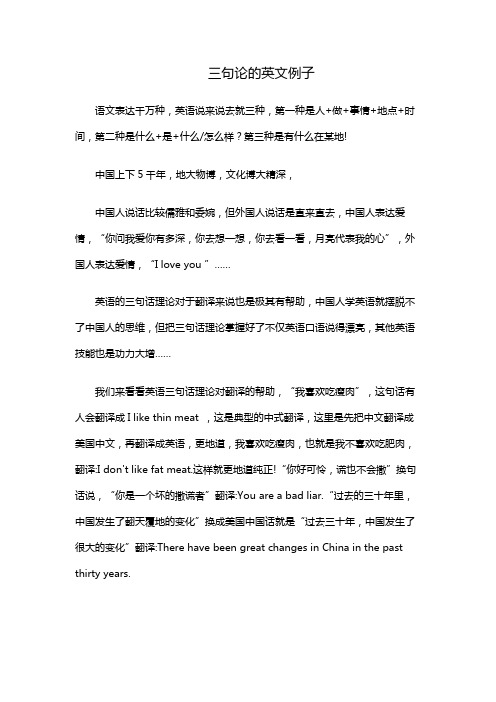
三句论的英文例子
语文表达千万种,英语说来说去就三种,第一种是人+做+事情+地点+时间,第二种是什么+是+什么/怎么样?第三种是有什么在某地!
中国上下5千年,地大物博,文化博大精深,
中国人说话比较儒雅和委婉,但外国人说话是直来直去,中国人表达爱情,“你问我爱你有多深,你去想一想,你去看一看,月亮代表我的心”,外国人表达爱情,“I love you ”……
英语的三句话理论对于翻译来说也是极其有帮助,中国人学英语就摆脱不了中国人的思维,但把三句话理论掌握好了不仅英语口语说得漂亮,其他英语技能也是功力大增……
我们来看看英语三句话理论对翻译的帮助,“我喜欢吃瘦肉”,这句话有人会翻译成I like thin meat ,这是典型的中式翻译,这里是先把中文翻译成美国中文,再翻译成英语,更地道,我喜欢吃瘦肉,也就是我不喜欢吃肥肉,翻译:I don't like fat meat.这样就更地道纯正!“你好可怜,谎也不会撒”换句话说,“你是一个坏的撒谎者”翻译:You a re a bad liar.“过去的三十年里,中国发生了翻天覆地的变化”换成美国中国话就是“过去三十年,中国发生了很大的变化”翻译:There have been great changes in China in the past thirty years.
中国人觉得很难的英语,在这里却是那么的简单,人人都可以说一口漂亮的英语,哪怕是零基础的,都可以,只要你找到一个支点,就可以撬动英语,人与人要交流,交流就要说句子,英语句子的支点就是动词。
- 1、下载文档前请自行甄别文档内容的完整性,平台不提供额外的编辑、内容补充、找答案等附加服务。
- 2、"仅部分预览"的文档,不可在线预览部分如存在完整性等问题,可反馈申请退款(可完整预览的文档不适用该条件!)。
- 3、如文档侵犯您的权益,请联系客服反馈,我们会尽快为您处理(人工客服工作时间:9:00-18:30)。
第三课我有……I have …“我是什么”是建立在“我有什么”的基础之上的。
如果我什么都没有,那么我什么也不是。
“我有”是“我是”的基础,“我是”通常也会导致更多的“我有”。
在美国做事,你最好要有“ID, Social Security Number, Driver's License, Degree, and working experience”。
有了以上基本的东西,你就慢慢会有更多的“income, vacation, benefit, car, house, and fame”。
美国是资本主义社会,资本主义的核心就是个体追求拥有更多的资本。
在追求更多的资本的过程中就会有竞争,因此就会出现社会两极分化现象即所谓马太效应:拥有的得到更多,没有的失去更多。
我初到美国的时候,只有两个皮箱。
六年后,拥有了一大堆的书,一张博士后证书,一张纽约州心理学家执照。
其他呢?其他就会在我拥有的这三样东西上慢慢生出来。
“我有”也不总是好的,有时我有“病和麻烦”,也有“对手”甚至“敌人”。
人的一生实在是在玩一种拥有和失去的游戏。
检查证件A: Do you have a driver's license?你有驾驶证吗?B: No, I don't have.我没有。
A: Do you have any other IDs?有任何其他的证件吗?B: Yes, I have a state ID.是的,我有州身份证。
初到美国A: What did you have when you came here?初到这里的时候你有什么?B: I only had two hundred dollars.我只有两百美元。
A: How could you survive?你怎么能生存呢?B: I immediately started to work as a waiter.我马上找了一份服务员的工作。
奋斗结果A: Now what do you have?现在你有什么?B: I have a doctor degree and a formal job.我有一个博士学位和正式工作。
A: You must have more than that.你应该还有更多吧。
B: Yes, I have a house and a happy family.是的,我有一栋房子和一个快乐的家庭。
几个孩子A: How many kids do you have?你有几个孩子?B: I have three kids, one boy and two girls.我有三个孩子,一个男孩和两个女孩。
A: How are they?他们好吗?B: They are the most lovable kids in the world.他们是世界上最可爱的孩子。
成功秘诀A: You have to be enough to win the game.你必须足够顽强才可以赢。
B: Yes, I have a lot of courage.是的,我有足够的勇气。
A: You also need more strength.你还需要更多力量。
B: I think I have the strength to be the best.我想我有力量做到最好。
狮子开口A: May I ask you to do me a favor?我可以请你帮我一个忙吗?B: Yes, what can I do for you?是的,我能为你做什么吗?A: Could you lend me 5000 dollars?你可以借我5000美元吗?B: I don't have that much money on me.我现在没有那么多的钱。
问题困难44A: Do you have any questions or problems?你有什么问题和困难吗?B: I have a lot of questions but no problems.我有很多问题但没有困难。
A: What are your questions?你的问题是什么?B: One of my question is how to speak English without fear.我的问题之一是如何才能大胆说英语。
胆小根源A: I didn't have the nerve to say what I thought.我没有胆量说出我想的东西。
B: Are you scared of somebody?你是怕什么人吗?A: Yes, I am scared hell out of my mother.是的,我怕我的母亲。
B: A psychologist may help you overcome your fear.心理医生可以帮助你克服恐惧。
被迫选择A: You have to make a choice.你必须做出选择。
B: If I don't make a choice, what will happen?如果我不做选择,会有什么事?A: You may lose everything.你可能失去一切。
B: I see. I have no choice but to make a choice.我明白,我除了做出选择外别无选择。
工作狂A: I have a duty to care for the patients.我有关心病人的责任。
B: But you don't have a duty to care for your family?你没有关心家庭的责任吗?A: Yes, I love you more than you imagine.当然有,我爱你超出你的相像。
B: But why do you come home so late every day?但你为什么每天回家这么晚?难留客人A: I must go. I have a bus to catch.我必须走了。
我要赶班车。
B: Don't hurry. There are plenty of buses.不要急,有很多班车呢。
A: I've got a lot of homework tonight.我今晚有很多家庭作业。
B: I sounds like I have no choice but let you go.听起来我除了让你走以外别无选择。
心有灵犀A: I had the impression that he was watching me.我觉得他在观察我。
B: You think he is falling in love with you?你认为他爱上你了?A: I don't know, maybe.我不知道,可能吧。
B: If you like him, just ask him.如果你喜欢他,就问问他。
失恋阵营46A: You see, he had his head in his hands.你看,他用手抱住头。
B: His girlfriend broke up with him.他的女友和他分手了。
A: I see. I had the similar feeling.我明白了,我曾有相似的经历。
B: Really? Were you dumped by a girl?是吗?你被一个女孩甩了?晚会期待A: Let's have a party this weekend.这个周末搞一个晚会吧?B: That's great, so I'll have a lot of food to eat.那太好了,我就有很多食物可以吃了。
A: You will have more than food.你会有比食物更多的东西。
B: Really? Let me guess what I will have.是吗?让我猜一猜我会有什么。
晚会交友A: How was your party last night?你昨晚的晚会如何?B: I had a wonderful time.我玩的很好。
A: Really, do you make some new friends?是吗,你交了一些新朋友吗?B: Yes, I made a couple of interesting friends.是的,我交了几个有趣的朋友。
正餐聚会A: How about having dinner together after work?下班后去吃饭好吗?B: I'm happy to go.我很愿意去。
A: What kind of food do you prefer?你喜欢什么样的食物?B: I prefer to have Japanese food.我喜欢日本菜。
点菜A: Are you ready to order?你准备好点菜了吗?B: Yes, I'll have the salmon and salads.是的,我要三文鱼和色拉。
A: Any drink? 要饮料吗?B: Ice water is enough.冰水就够了。
付账客气A: Can I have the bill, please.可以把账单给我吗?B: No, it's on me.不,我请客。
A: Okay, next time I will treat you.好的,下次我请你。
B: If you please.那就不客气了。
便餐A: I'm going to have a lunch.我要去吃午饭。
B: Can I go with you?我可以和你一起去吗?A: More than happy.当然。
B: I have some issues to talk to you.我有一些事和你谈。
忙碌周末A: I'm having the kids for the weekend.周末我和孩子们在一起。
B: That must be a lot of fun.那一定很有意思了。
A: I also had dinner with some friends last night.昨晚我也和几个朋友们一起吃饭。
B: You are busy. I'm jealous of you.你真忙,我真嫉妒你。
窃贼光顾A: I had my bag stolen.我的包被偷了。
B: How come that happened?怎么会的?A: A thief broke the window of my car.一个小偷砸破了我的车玻璃。
